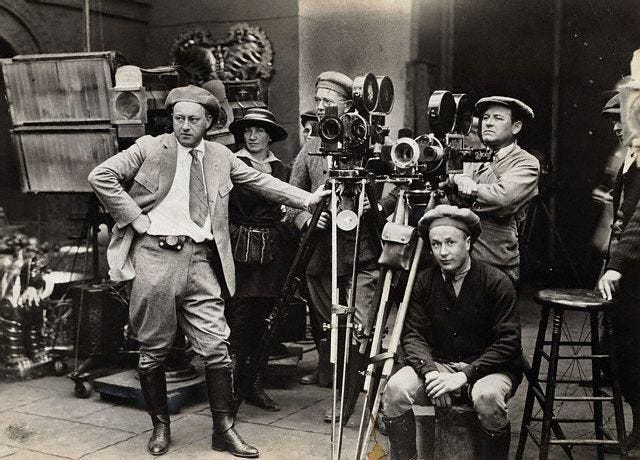When is it OK to Back Out of a Project?
Building Bridges
Someone new to the industry was looking for advice recently:
I understand that trust and loyalty are very valued in the industry and it could go very bad leaving a project you already said yes to for another offer. I’m just starting out in the industry and have managed to land several PA jobs in big projects. My goal is to become an AD and script supervisor.
I managed to establish a relationship with a script supervisor and let them know that I have some experience and was looking to get into the field more. The script supervisor took a chance on me, and when the production suddenly decided to add a 2nd unit, they recommended me. It turned out to be a great experience and the script supervisor felt like a mentor to me during the shoot, which I am very grateful for.
They texted me that their friend is shooting a short film, and was recommending me to be script supervisor since they wouldn’t be able to. I said yes and was put in contact with their friend. The friend confirmed the shoot days and told me she’d stay in touch to provide more details in the future.
I just received an offer to work on a (union-approved) big production as a PA, and the dates unfortunately clash. I want to say yes because it would be a great opportunity to work with a major crew in my area, and frankly I really need the money from a long production.
I could realistically find an adequate replacement, but I’m having a lot of anxiety on the script supervisor who recommended me taking offense. What should I do?
Landing multiple projects with overlapping dates is a luxury problem to have, but it’s still a problem.
This post is too long for email, so if you’re reading this in your inbox, click the headline above to see the whole thing on the Substack website or app.
Priorities
There are four independent factors at play here—
Reliability. When you say yes to a job, you should stick to that agreement, as a matter of principle.1
Money. Paid jobs always take priority over free work, and everyone understands that.
Experience. A better title can make up for lack of pay, if it means advancing your career trajectory.
Relationships. Do you ever want to work with these people again?
The first two points cancel each other out. That’s not uncommon, to be honest. Someone who’s shooting on a shoestring will usually plan things well in advance, to get commitments from cast, crew, locations, etc. Big productions, on the other hand, tend to solve problems with the money hose. Part of what they’re paying you for is ditching whatever plans you had for that shoot day.
Experience vs money comes down to long-term vs short-term rewards. Real, on-set experience is extremely valuable over the course of your career, but you still have to eat and pay rent. Always keep in mind that there’s no long-term if you can’t survive the short term.
But if you’re really thinking long-term, what matters most is relationships. Do you like the person you’re working for pro bono, more than you need the money? Is that a bridge you want to burn?
The above question has an extra wrinkle, too—the person recommending you looks bad if you drop out after taking the gig. Dropping out means harming two relationships.
Real friendships can complicate things, as well. If it’s your cousin or brother-in-law or childhood friend, dropping out and leaving them in the lurch can really hurt their feelings.
Conversely, do you want to build a bridge with the people offering a paid gig? It likely won’t offend them if you simply tell them you’re already booked. But they will hire somebody else, and if they like working with that somebody else, that’s who they’ll hire on the next shoot.
You’re comparing a destroyed bridge with a hypothetical bridge. Which, let’s face it, may not ever be built if the professional shoot doesn’t go well for whatever reason.
It’s a judgement call, and unfortunately, no one can really answer it but you.
Softening the Blow
If you do decide to take the paying job (which, again, many people will understand, even though it means they get the short end of the stick), you should at the very least try to find a replacement for yourself. That’s essentially what happened in the story above, leaving the filmmaker with a third-hand recommendation; but when you’re shooting a no-budget short, you take what you can get.
Bear in mind, this also carries some risk. Just like your paid gig may not go well, the short project could go very well. If the director and scripty get along, you’ll be a matchmaker who gets forgotten about when the next shoot—possibly a paid shoot—comes around.
I was a beneficiary of this scenario, long ago. I had some experience as a camera assistant, and pulled focus for a friend-of-a-friend’s web series. I didn’t get along with the camera crew, but I did strike up a friendship with the producer, who also hated the rest of my department. After I confessed I really wanted to be a writer, not a DP, he offered to produce my first (non-student) short film. Eventually, this led to him producing my first feature film as a writer/director.2
All because some guy I never met turned down a non-paying 2nd AC gig.
The future is unknown. Sometimes you have to make tough choices without fully knowing the outcomes. Such is life, both in the Industry and beyond it.
Unless, of course, they don’t hold up their end of the deal, but that’s not what’s happening here.
Yes, my nom de web is still The Anonymous Production Assistant, but I haven’t been a PA in a long time.




Honestly when you’re starting out you gotta take the paid work you can get, especially if it’s long term. I think your mentor should understand that. I would ask him about it and see what he says.
Such a great post. Thanks